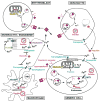The genetics of essential metal homeostasis during development
- PMID: 18395838
- PMCID: PMC2366893
- DOI: 10.1002/dvg.20382
The genetics of essential metal homeostasis during development
Abstract
The essential metals copper, zinc, and iron play key roles in embryonic, fetal, and postnatal development in higher eukaryotes. Recent advances in our understanding of the molecules involved in the intricate control of the homeostasis of these metals and the availability of natural mutations and targeted mutations in many of the genes involved have allowed for elucidation of the diverse roles of these metals during development. Evidence suggests that the ability of the embryo to control the homeostasis of these metals becomes essential at the blastocyst stage and during early morphogenesis. However, these metals play unique roles throughout development and exert pleiotropic, metal-specific, and often cell-specific effects on morphogenesis, growth, and differentiation. Herein, we briefly review the major players known to be involved in the homeostasis of each of these essential metals and their known roles in development.
(c) 2008 Wiley-Liss, Inc.
Figures



References
-
- Andrews GK. Regulation of metallothionein gene expression. Prog Food Nutr Sci. 1990;14:193–258. - PubMed
-
- Andrews GK, Geiser J. Expression of metallothionein-I and -II genes provides a reproductive advantage during maternal dietary zinc deficiency. J Nutr. 1999;129:1643–1648. - PubMed
-
- Andrews GK, Lee DK, Ravindra R, Lichtlen P, Sirito M, Sawadogo M, Schaffner W. The transcription factors MTF-1 and USF1 cooperate to regulate mouse metallothionein-I expression in response to the essential metal zinc in visceral endoderm cells during early development. EMBO J. 2001;20:1114–1122. - PMC - PubMed
-
- Andrews GK, Wang H, Dey SK, Palmiter RD. The mouse zinc transporter 1 gene provides an essential function during early embryonic development. Genesis. 2004;40:74–81. - PubMed
-
- Andrews NC. Iron homeostasis: Insights from genetics and animal models. Nat Rev Genet. 2000;1:208–217. - PubMed
Publication types
MeSH terms
Substances
Grants and funding
LinkOut - more resources
Full Text Sources
Medical

